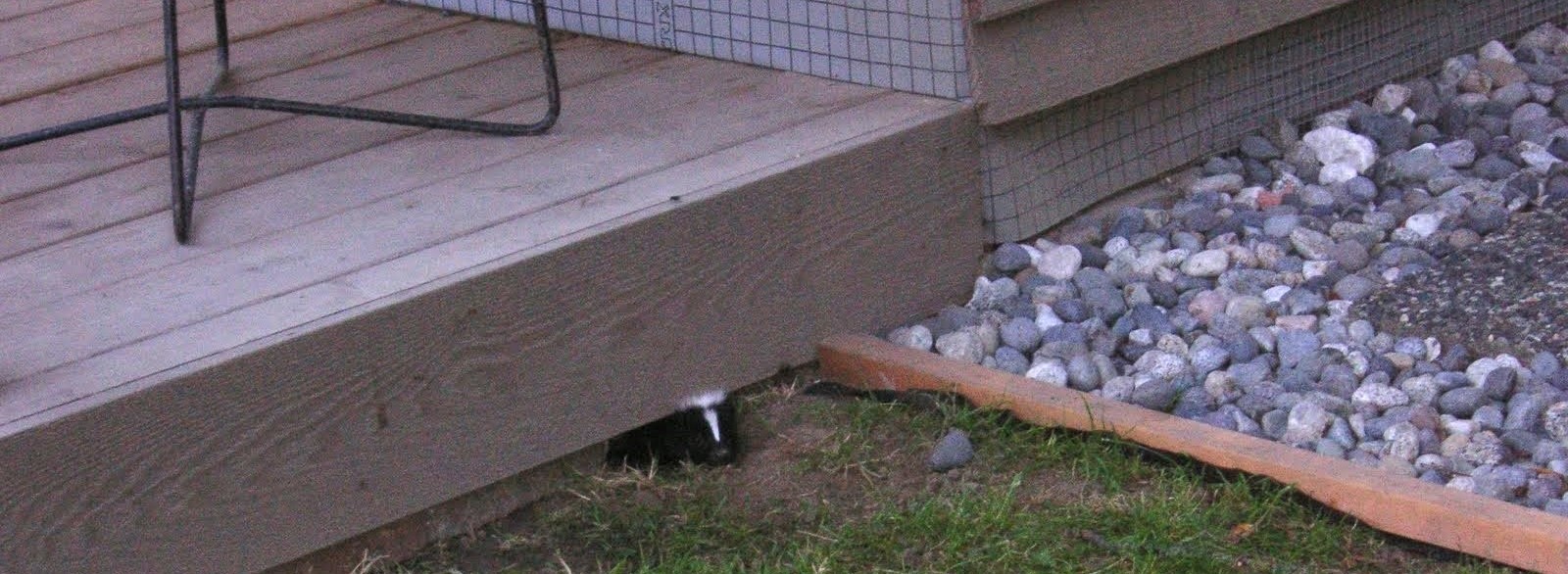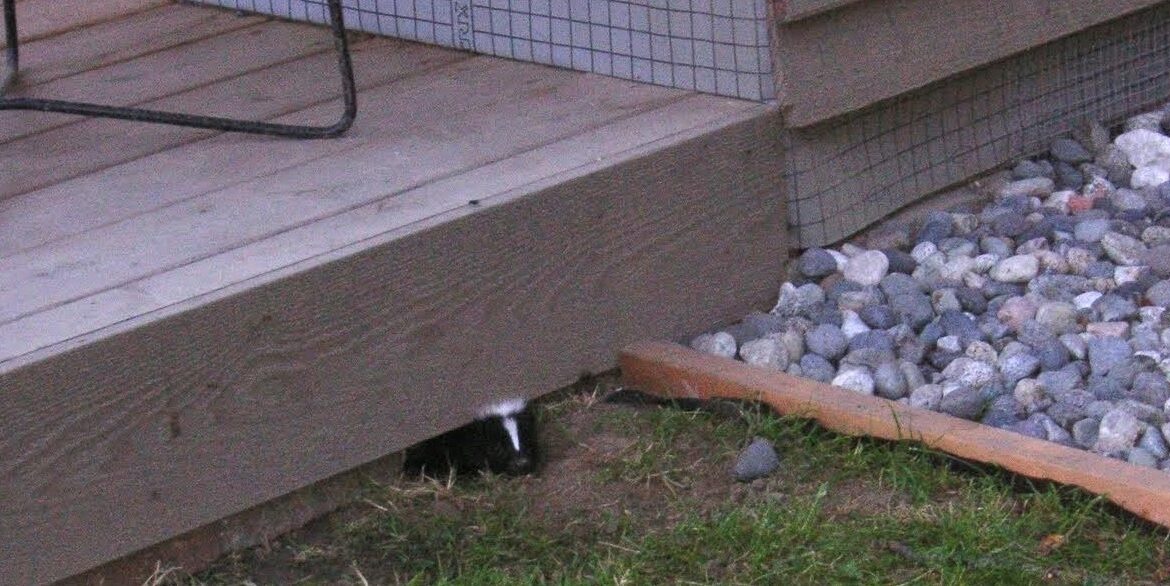Walking through your Mississauga neighbourhood at dusk, you might notice a distinct black and white figure scurrying across your lawn or garden. The question “Are skunks nocturnal?” is one that many homeowners ponder when they spot these creatures outside their usual nighttime hours. Understanding skunks’ nocturnal behaviour is essential for residents who want to protect their properties and peacefully coexist with local wildlife.
At Skedaddle, we’ve spent over three decades studying and managing wildlife, including skunks, in a humane manner. Just as the Credit River winds through our beautiful city, these animals navigate our neighbourhoods under the cover of darkness, following their natural instincts.
Let’s explore the fascinating world of these misunderstood creatures and learn how to effectively manage potential conflicts with them.
Understanding Skunks’ Nocturnal Behaviour
Skunks are predominantly nocturnal animals, meaning they’re most active during nighttime hours. This natural behaviour pattern allows them to navigate their environment with less risk from predators and human interaction.
- Peak Activity Hours: Skunks typically emerge from their dens at dusk and return before dawn, utilizing darkness for protection.
- Seasonal Variations: During spring and summer months, skunks might be more visible during daylight, especially mother skunks teaching their young to forage.
- Environmental Factors: Weather conditions, food availability, and urban development can influence when skunks are most active.
Night Vision Advantage: Skunks have evolved to thrive in low-light conditions. Their eyes contain a high number of rod cells that enhance their ability to see in dim light, although their overall vision is relatively poor compared to other mammals.
Sensory Adaptations: What skunks lack in visual acuity, they make up for with excellent hearing and an acute sense of smell, helping them locate food sources even in complete darkness.
Skunk activity at night is primarily driven by their search for food, which consists of insects, small rodents, fruits, and vegetation. This nocturnal foraging helps control pest populations in your yard, offering an often-overlooked ecological benefit.
Daytime Skunk Sightings: Should You Be Concerned?
Many residents worry when they spot a skunk during daylight hours, believing it might be sick or rabid. While this concern is understandable, daytime activity doesn’t automatically indicate illness.
Reasons for Daytime Activity:
- Food Scarcity: During periods when food is harder to find, skunks may extend their foraging into daylight hours.
- Maternal Behaviour: Mother skunks with kits (baby skunks) often emerge during the day, particularly in late spring and early summer, to teach their young foraging skills.
- Seasonal Changes: As daylight hours extend during summer months, skunks might adjust their activity patterns accordingly.
- Human Disturbance: Construction, landscaping, or other human activities near their dens can temporarily disrupt normal patterns.
Normal vs. Abnormal Behaviour: A healthy skunk out during the day will typically move with purpose, appear alert, and avoid human contact. Signs that may indicate illness include staggering, circling, showing aggression without provocation, or appearing disoriented.
Skunk Denning Habits in Mississauga Neighbourhoods
Understanding where and why skunks establish dens is crucial for effective control efforts. These animals seek out protected, secluded spaces that provide shelter from the elements and predators.
In urban areas, skunks have adapted to utilize human structures to their advantage. They often dig beneath:
- Decks and porches: The covered space provides protection.
- Sheds and outbuildings: Particularly those with gaps underneath.
- Home additions: Especially those built without full foundations.
- Landscaping features: Rock walls, woodpiles, or dense shrubbery.
Den Identification Signs: Fresh soil mounds around a 4-8 inch opening, small patches of disturbed lawn where grubs have been dug up, and distinctive five-toed tracks are all indicators of skunk activity around your property.
Seasonal Considerations: Fall is a critical time as skunks prepare winter dens. During winter months, while not truly hibernating, skunks enter a state of torpor with reduced activity, often remaining in their dens for extended periods.
The Impact of Skunk Activity at Night on Your Property
While skunks generally prefer to avoid human contact, their nighttime activities can have sizable impacts on your property:
Potential Property Concerns
- Lawn Damage: Skunks dig small, cone-shaped holes in lawns while searching for grubs and insects – a telltale sign of their nocturnal feeding habits.
- Garden Disruption: Vegetable gardens and berry bushes may be visited regularly, with produce damaged or consumed.
- Structural Issues: Their powerful digging abilities allow them to create extensive burrow systems under structures, potentially affecting stability over time.
- Odour Problems: The infamous skunk spray can permeate buildings, particularly if a skunk feels threatened near your home.
- Health Considerations: While direct disease transmission from skunks to humans is rare, their droppings can contain harmful bacteria and parasites.
However, it’s important to recognize the ecological benefits skunks provide. Their consumption of garden pests helps maintain balance in your yard ecosystem. A single skunk can consume thousands of grubs and insects in a season, offering natural pest management services.
Humane Approaches to Managing Skunks in Mississauga
At Skedaddle, we emphasize humane approaches to wildlife management that respect the animal while protecting your property. When dealing with skunks, timing and technique are crucial.
Prevention Strategies:
- Eliminate Food Sources: Secure garbage cans, remove fallen fruit, and consider treating your lawn for grubs to reduce attractions.
- Reduce Shelter Options: Block access to spaces under structures with appropriate barriers before skunks move in.
- Apply Deterrents: Motion-activated lights and sprinklers can discourage nighttime visitors without causing harm.
- Maintain Your Yard: Regular lawn upkeep and clearing brush piles reduce habitat appeal.
Best Removal Timing: Fall is optimal for removal, before skunks settle in for winter and well before spring when mothers give birth to kits (May-June).
Professional Expertise Matters: Attempting DIY removal increases your risk of being sprayed and may create situations where baby skunks are separated from their mothers. Our trained technicians utilize specialized techniques to ensure humane removal.
Mississauga Skunk Control: Skedaddle’s Humane Approach
Our process for addressing skunk issues in Mississauga homes follows a proven methodology developed over decades of wildlife management experience.
Our Three-Step Process:
- Assessment & Removal: We conduct a thorough inspection, identify entry points, and humanely remove skunks using techniques that prevent spraying incidents. For mothers with kits, we use heated baby reunion boxes that safely keep babies while allowing the mother to relocate them.
- Clear & Clean: We remove contaminated material and thoroughly clean affected areas to eliminate odours and harmful bacteria that could impact your family’s health.
- Prevent & Protect: We install heavy-gauge screening buried 8-12 inches into the ground around vulnerable structures, creating a permanent barrier that prevents future digging while maintaining your property’s aesthetic appeal.
The Skedaddle Difference: Unlike basic removal services, we address the entire situation – from current inhabitants to future prevention and habitat modification. Our solutions are designed for long-term effectiveness while respecting the local wildlife.
If skunk activity is causing concerns around your home, don’t wait to address the issue. Skedaddle is here to ensure that both your household and local wildlife remain safe and healthy. Contact Skedaddle today for expert assistance in managing wildlife on your property, and experience the peace of mind that comes with knowing your home is protected by professionals.




